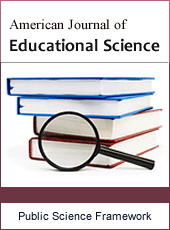American Journal of Educational Science
Articles Information
American Journal of Educational Science, Vol.1, No.2, May 2015, Pub. Date: May 26, 2015
The Interconnection Between Interpretivist Paradigm and Qualitative Methods in Education
Pages: 24-27 Views: 16188 Downloads: 91062
[01]
Nguyen Cao Thanh, Doctor of Education, Department of International Relations, Tan Trao University, Tuyen Quang, Vietnam.
[02]
Tran Thi Le Thanh, Doctor of Education, Vice-Rector of Tan Trao University, Tuyen Quang, Vietnam.
This study examines the interconnection between interpretivist paradigm and qualitative methods, and this is illustrated by some relevant points of the author’s PhD thesis in education. Taking account from a number of scholars, the paper shows that, interpretivism is a trend of research approach, and it prefers using qualitative methods in data collection. There is a tight connection between interpretivist paradigm and qualitative methodology as one is a methodological approach and one is a means in collecting data. Researchers who are using interpretivist paradigm and qualitative methods often seek experiences, understandings and perceptions of individuals for their data to uncover reality rather than rely on numbers of statistics.
Interpretivist Paradigm; Qualitative Methods; Research in Education
[01]
Cresswell, J. W. (Ed.). (2003). Research design: Qualitative, quantitative, and mixed methods approaches. (2nd ed. ed.). Thousand Oaks: Sage.
[02]
Cresswell, J. W. (Ed.). (2009). Research Design: Qualitative, Quantitative, and Mixed Methods Approaches (3rd ed.). Los Angeles: Sage.
[03]
Cohen, L., &Manion, L. (Eds.). (1994). Research methods in education (4th ed. ed.). London: Longman.
[04]
Glesne, C., &Peshkin, A. (1992).Becoming qualitative researchers. Thousand Oaks, CA: Sage.
[05]
Klen, H., & Meyers, M. (1998).A set of principles for conducting and evaluating interpretive field studies in information systems. Retrieved 12/9/2009, from http://www.auckland.au.nz/msis/isworld/MMyers/Klein-Myers.html
[06]
Livesey, C, (2006)The Relationship between Positivism, Interpretivism and sociological research methods. AS Sociology. http://www.sociology.org.uk
[07]
Mackenzie, N., &Knipe, S. (2006). Research dilemmas: Paradigms, methods and methodology. Issues In Educational Research, 16, 193-205.
[08]
Mac Naughton, G., Rolfe, S. A., &Siraj-Blatchford, I. (2001).Doing Early Childhood Research: International perspective on theory and practice. Australia: Allen &Unwin.
[09]
Morehouse, R. (2011). Beginning Interpretive Inquiry: A Step-by-Step Approach to Research and Evaluation. USA: Routledge.
[10]
McQueen, M. (2002). Language and power in profit/non-profit relationships: A grounded theory of inter-sectoral collaboration. Retrieved 12/9/2009, from http://au.geocities.com/dr_meryl_mcqueen/phd/mcqueen-ch3.htm
[11]
Marguerite, G. L., Dean, T. S., & Katherine, H. V. (2006).Methods in educational research: From theory to practice. San Francisco: Jossey-Bass.
[12]
Neuman (Ed.). (2000). Social research methods: qualitative and quantitative approaches (4th ed. ed.). Boston: Allyn& Bacon.
[13]
Nind, M., & Todd, L. (2011).Prospects for educational research. International journal of Research & Method in Education, 1(34), 1-2.
[14]
Punch, F. K. (2009). Introduction to research methods in education. London: Sage.
[15]
Smith, J. (1993). After the demise of empiricism: The problem of judging social and educational inquiry. New York: Ablex.
[16]
Silverman, D. (2000). Doing qualitative research: A practical handbook. London, Thousand Oaks, New Delhi: Sage.
[17]
Thomas, R. M. (2003). Blending Qualitative and Quantitative: Research methods in theses and dissertations. California: Sage.
[18]
Willis, J. W. (2007). Foundations of qualitative research: interpretive and critical approaches. London: Sage.
[19]
Yanow, D., & Schwartz-Shea, P. (2011).Interpretive Approaches to Research Design: Concepts and Processes. Netherlands: Routledge.

ISSN Print: 2381-7127
ISSN Online: 2381-7135
Current Issue:
Vol. 6, Issue 2, June Submit a Manuscript Join Editorial Board Join Reviewer Team
ISSN Online: 2381-7135
Current Issue:
Vol. 6, Issue 2, June Submit a Manuscript Join Editorial Board Join Reviewer Team
| About This Journal |
| All Issues |
| Open Access |
| Indexing |
| Payment Information |
| Author Guidelines |
| Review Process |
| Publication Ethics |
| Editorial Board |
| Peer Reviewers |


